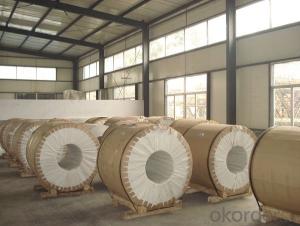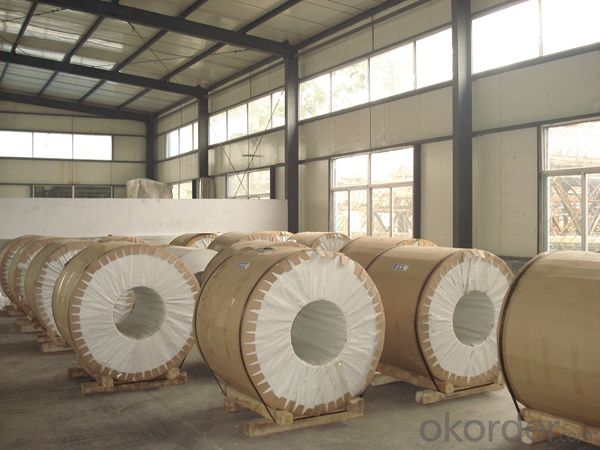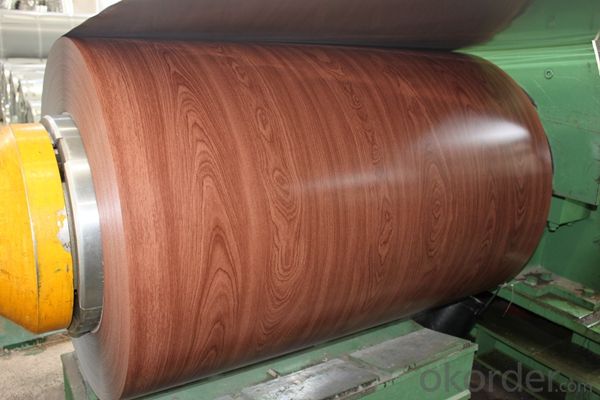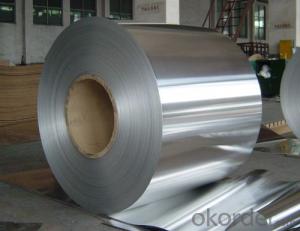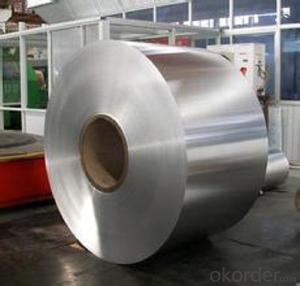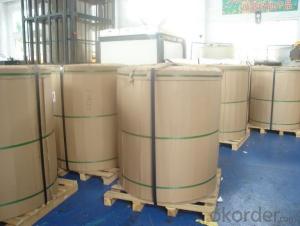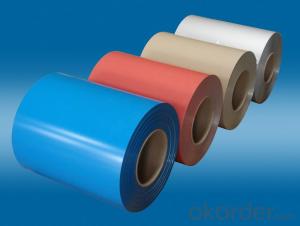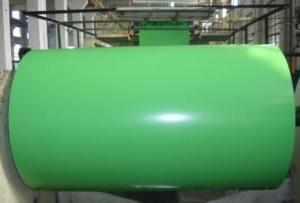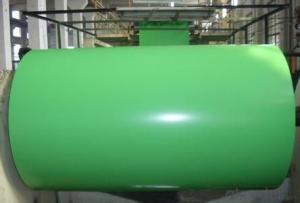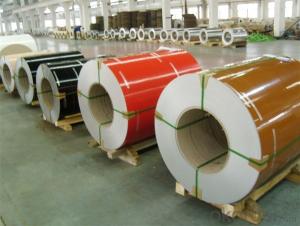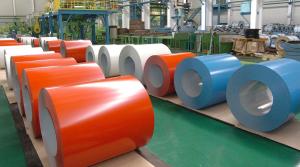5005 Aluminum Coil - Color Coating PE Painting for Inside Doors
- Loading Port:
- Shanghai
- Payment Terms:
- TT OR LC
- Min Order Qty:
- 5 m.t.
- Supply Capability:
- 10000 m.t./month
OKorder Service Pledge
OKorder Financial Service
You Might Also Like
Specification
1. Specification of Color Coating Aluminium Coil PE Painting for Inside Doors
Material | Alloy Aluminum 1XXX,3XXX,5XXX or customer nominated |
Temper | T3, T4, T5, T6 |
Surface | Anodize, electrophoresis, powder coating,PVDF coating, wood grain painting, matted, etc. |
Colour | Any colour based on Standard Germany RAL Mark |
Length | Coating 6.5 meters, Anodizing 6.5 meters, Mill finish 5 meters |
Press Machine | 500-4000 tons all together 64 press lines. |
Fabrication | 1. Windows and doors; 2. Drilling; 3. Bending; 4. Cutting; 5. etc. |
Certificate | ISO 9001 |
Moulding | 1. Using our moulds, no fee; |
2. Using customer drawing, opening mould, usually about 10~50 tons then the moulding can be refunded. | |
3. Mould cost is negotiable base on the order quantity | |
Capability | Annual output 100,000 tons |
2. Application of Color Coating Aluminium Coil PE Painting for Inside Doors
(1).Interior: wall cladding, ceilings, bathrooms, kitchens and balconies, shutters, doors...
(2).Exterior: wall cladding, facades, roofing, canopies, tunnels,column covers , renovations...
(3).Advertisement: display platforms, signboards, fascia, shop fronts...
3. Feature of Color Coating Aluminium Coil PE Painting for Inside Doors
Be free from Oil Stain, Dent, Inclusion, Scratches, Stain, Oxide Dicoloration, Breaks, Corrosion, Roll Marks, Dirt Streaks and other defect which will interfere with use
4. Certificate:
SGS and ROHS(if client request, paid by client), MTC(plant provided), Certificate of Origin(FORM A, FORM E, CO), Bureau Veritas and SGS (if client request, paid by client), CIQS certificate
5. Image of Color Coating Aluminium Coil PE Painting for Inside Doors
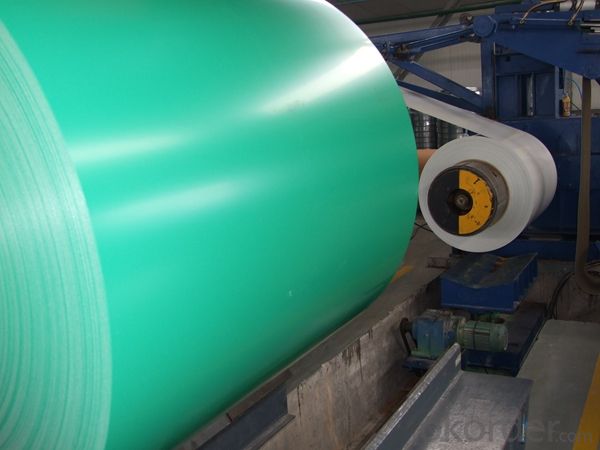
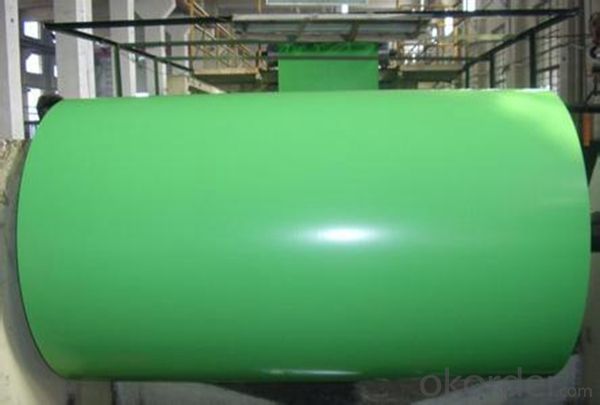
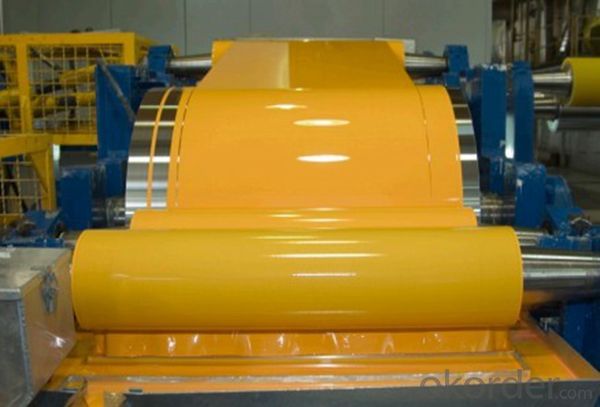
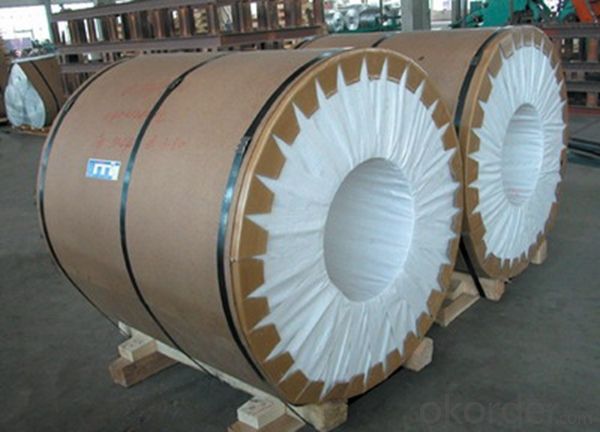
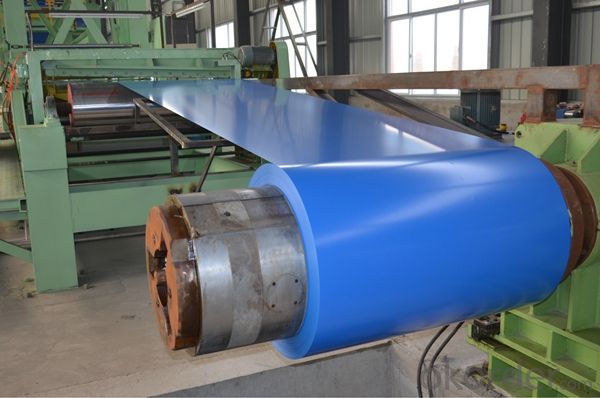
6. Package and shipping of Color Coating Aluminium Coil PE Painting for Inside Doors
eye to wall
eye to the wall
with wood pallet (wooded case also available)
7. FAQ
1) What is the delivery time?
Dpends on actual order, around 20 to 35 days
2)What is the QC system:
We have QC staff of 20 persons and advanced equipment, each production is with MTC traced from Aluminum ingot lot.
3) What market do you mainly sell to?
Australia, America, Asia, Middle East, Western Europe, Africa etc
- Q: Can you create a tank, AFV, IFV etc. from aluminium or is this just a stupid idea that would kill everyone inside?
- Most military vehicles these days are made out of a super high grade strength linoleum. That way, if they're ever needed to be lifted out by a helicopter or some other flying vehicle, they're light enough. And it also is easier to repair damage and clean off blood stains as compared to other types of metal.
- Q: Is it safe and practical to use aluminum coils in cooking processes?
- <p>Aluminum coils can be used for cooking, but with certain precautions. They are commonly used in commercial kitchens for their heat conductivity and durability. However, for home cooking, it's important to avoid acidic or alkaline foods, as aluminum can react with them. Additionally, prolonged exposure to heat can cause aluminum to leach into food, which some studies suggest may have health implications. It's advisable to use aluminum cookware with a protective coating or opt for alternative materials like stainless steel or cast iron for health-conscious cooking.</p>
- Q: How do aluminum coils contribute to architectural design flexibility?
- Aluminum coils contribute significantly to architectural design flexibility due to their unique properties and versatility. Firstly, aluminum coils are lightweight, which makes them easier to handle and install compared to other materials like steel or concrete. This characteristic allows architects to explore more creative and innovative designs without worrying about the weight limitations. It also enables the construction of large and complex structures, providing architects with greater freedom in their designs. Secondly, aluminum coils offer a wide range of surface finishes and colors. They can be painted, anodized, or coated with various materials, allowing architects to achieve desired aesthetic effects and match the building's appearance with its surroundings or the intended architectural style. This wide range of finishes enables architects to experiment with different visual effects, textures, and patterns, thereby enhancing the overall design flexibility. Furthermore, aluminum coils possess excellent corrosion resistance properties. This durability ensures that the architectural elements made from aluminum coils can withstand harsh weather conditions, such as rain, snow, or UV radiation, without deteriorating over time. This enhanced lifespan and low maintenance requirement make aluminum coils an attractive choice for architects seeking long-lasting and sustainable design solutions. Additionally, aluminum coils can be easily formed, bent, or shaped into various profiles and dimensions. This malleability allows architects to create customized architectural elements that fit specific design requirements, such as curved facades, intricate detailing, or irregular shapes. The ability to shape aluminum coils according to the architects' vision enables the realization of unique and distinctive designs that stand out in the architectural landscape. Lastly, aluminum coils are recyclable and environmentally friendly. The use of aluminum in architectural design aligns with sustainable practices, as it can be recycled repeatedly without losing its properties. This aspect appeals to architects and clients who prioritize eco-friendly design solutions and wish to reduce their carbon footprint. In conclusion, aluminum coils contribute significantly to architectural design flexibility by offering lightweight construction, a wide range of surface finishes, excellent corrosion resistance, malleability, and recyclability. These characteristics empower architects to push the boundaries of design, create visually stunning structures, and deliver sustainable and long-lasting architectural solutions.
- Q: This question asks about the potential health impacts of aluminum coils, which are commonly used in various industries and products.
- <p>Aluminum coils themselves are generally considered safe and do not directly affect health when used in their typical applications such as construction, electrical components, or food packaging. However, there is ongoing debate about the potential health risks of aluminum exposure, particularly when ingested. Some studies suggest a link between aluminum and neurological disorders like Alzheimer's disease, though this is not conclusively proven. It's important to note that aluminum is a common element found naturally in the environment, and the human body can naturally excrete small amounts. The use of aluminum coils in food packaging is regulated to ensure safety, and the risk of aluminum toxicity from these sources is considered low.</p>
- Q: What are the different packaging options available for aluminum coils?
- Customers have several packaging options to choose from for aluminum coils, depending on their specific needs and requirements. Some commonly used packaging options include: 1. Wooden crates: Sturdy wooden crates offer maximum protection for aluminum coils during transportation and storage. These crates are made of high-quality wood and designed to withstand rough handling, preventing coil damage. 2. Cardboard boxes: Smaller aluminum coils can be packaged in lightweight and cost-effective cardboard boxes. These boxes provide adequate protection against minor impacts and environmental factors. 3. Steel or aluminum skids: Aluminum coils can be placed on steel or aluminum skids for packaging. Skids provide a stable base and allow for easy handling using forklifts or pallet jacks. They are commonly used for larger coils or when transporting multiple coils together. 4. Stretch wrap: Stretch wrap is a popular choice for packaging aluminum coils. It offers excellent protection against dust, moisture, and scratches. The coils are tightly wrapped in plastic film, ensuring secure transportation. 5. Custom packaging: In certain cases, customers may require customized packaging solutions to meet specific requirements. This can include using protective covers, foam padding, or additional reinforcements to ensure safe handling and delivery of the aluminum coils. It is important to consider factors such as coil size, weight, transportation method, and intended use when choosing a packaging option. Working with a reputable packaging provider can help determine the most suitable packaging option for aluminum coils.
- Q: What is the typical elongation of aluminum coils?
- The typical elongation of aluminum coils can vary depending on several factors, such as the specific alloy and temper of the aluminum, the manufacturing process, and the intended application. However, aluminum coils generally exhibit a high elongation capability. On average, aluminum coils can have an elongation of around 5-15%, which means they can stretch or deform by this percentage without fracturing or breaking. This property is a result of the inherent ductility of aluminum, which allows it to be easily formed and shaped without losing its structural integrity. The elongation of aluminum coils plays a significant role in various industries, such as construction, automotive, and aerospace, where the material is commonly used. It allows for efficient fabrication processes, such as bending, rolling, and stamping, to create complex and precise shapes. It is important to note that the elongation of aluminum coils can be further improved through specific alloying elements and heat treatments. These processes can enhance the material's properties, making it even more suitable for demanding applications that require superior strength, ductility, and elongation capabilities. In conclusion, while the typical elongation of aluminum coils ranges from 5-15%, it is crucial to consider the specific alloy, temper, and manufacturing processes to accurately determine the elongation properties for a particular application.
- Q: What can I get easily at Home Depot that will successfully bond rubber to aluminum?? I have tried several things with no success! Surely, there must be some sort of construction adhesive to do the job.Thanks!
- Go to an automotive parts store, like Pep Boys- they sell a gasket adhesive for rubber trim on cars that works very well- Also, there is an outstandingly strong spray adhesive called 3M-77 - buy it in the paint sections at Lowes( about $13.00 a can- but it is a big can!) Spray on the aluminum, spray on the rubber- let dry for about ten minutes and attach- Be careful- 77 is a one way adhesive- once it is stuck, no repositioning it- it's stuck for good! Do not wear latex or rubber gloves- they will stick, too- wear cheap cotton or jersey gloves while working with this kind of instant adhesive. BTW, be sure to clean the aluminum and rubber with solvent before applying the adhesive- any oil and the fix won't work.
- Q: Can aluminum coils be used for food storage containers?
- Yes, aluminum coils can be used for food storage containers. Aluminum is a safe and commonly used material for food packaging due to its non-toxic, lightweight, and corrosion-resistant properties. It helps to preserve the freshness, flavor, and quality of food while also being recyclable and environmentally friendly.
- Q: What are the fire-resistant properties of aluminum coils?
- Aluminum coils possess excellent fire-resistant properties due to their high melting point, which is approximately 660 degrees Celsius or 1220 degrees Fahrenheit. This makes them less likely to ignite or contribute to the spread of fire. Additionally, aluminum's low flammability and ability to dissipate heat quickly help to minimize the risk of fire-related accidents.
- Q: What is the typical modulus of elasticity for aluminum coils?
- Aluminum coils typically have a modulus of elasticity of approximately 70 GPa (gigapascals) or 10 million psi (pounds per square inch). The modulus of elasticity gauges a material's inflexibility or capacity to withstand distortion under an external force. Aluminum is renowned for its impressive strength-to-weight proportion and remarkable elasticity, rendering it a favored option across diverse sectors such as automotive, aerospace, and construction. Nonetheless, it is noteworthy to acknowledge that the modulus of elasticity may slightly differ depending on the particular alloy and temper of the aluminum coil.
Send your message to us
5005 Aluminum Coil - Color Coating PE Painting for Inside Doors
- Loading Port:
- Shanghai
- Payment Terms:
- TT OR LC
- Min Order Qty:
- 5 m.t.
- Supply Capability:
- 10000 m.t./month
OKorder Service Pledge
OKorder Financial Service
Similar products
Hot products
Hot Searches
Related keywords
